Ranking in social search means getting your keyword research right. This post breaks down how to create a list of social media keywords your brand can rank for.

Should brands treat social SEO keywords like search terms on Google?
The short answer: not exactly.
Sure, both Google and social media use keywords as part of their ranking algorithms. We’ve seen how consumers often use similar phrases across both channels, too.
But consider how different search engines attract different types of searchers.
Search intent and expectations for a customer scrolling for TikTok videos aren’t the same as someone reading long-form Google reviews. That’s a big reason why your social media keyword strategy is rarely 1:1 with your regular SEO strategy.
We know that social SEO is still a new concept for many brands. We’re here to help!
This post digs into how brands can target social media keywords with confidence.
How to Conduct Social Media Keyword Research in 4 Steps
Good news: if you’ve targeted search terms on Google before, many steps of the social media keyword research process will be familiar.
And if not, we’ve still got you covered!
Below are four steps to conducting keyword research for social media from scratch.
1. Figure Out the Keywords Your Brands Is Already Ranking For
Ranking for social media keywords in the future starts with looking back at the past.
Although ranking in social search doesn’t work exactly the same as Google, you can still apply a few similar strategies to your social keyword research. For example:
Start with a Branded Social Media Search
No, this isn’t just a vanity search!
Seeing what your target audience is saying about your brand and products can be eye-opening, especially when pitted against your competitors.
Start with basic terms related to your brand name (ex: "Burt's Bees") and specific product names (ex: "The Balm Bottle"). Pay close attention to:
- “Versus” keyword phrases (ex: “Cerave vs Aquaphor)
- Review-related keyword phrases (ex: “Trade Coffee reviews”)
- Sentiment and related phrases in captions mentioning your products (ex: “best,” “favorite,” “cheapest,” “impressed,” “disappointed”)
Let’s say a viral TikToker is obsessing over the launch of your new cosmetics line. See what people are saying both in captions and comments as both impact your TikTok SEO. Not to mention that comments and captions are a goldmine for social media keyword ideas.
For example, you might find that your products pop up for phrases like “budget concealer,” “best cheap concealer,” and “bargain beauty products.” If so, awesome! These are the types of keywords worth ranking for via your branded and influencer content.
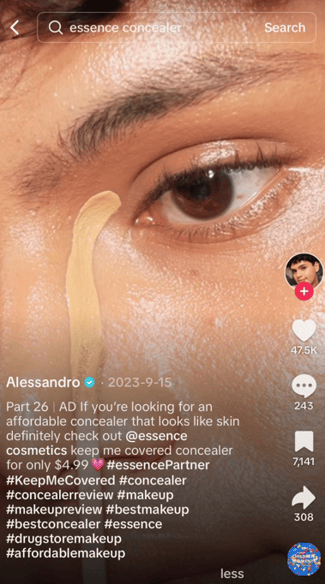
Source
Branded keywords such as your company name and product line names are obviously valuable to rank for, too. The catch? Rarely do brands rank for these terms themselves.
Instead, UGC and influencer content tend to rise to the top and dominate these terms. That’s why consistent creator posts go hand in hand with ranking in social search.
Peek Your Google Analytics for Social Keyword Inspiration
Note that this also applies to any other third-party SEO tools your team is using.
Let’s say a big chunk of your Google traffic comes from "women's waterproof shoes.”
Now, pop that phrase into TikTok or Instagram. Then assess:
- What types of videos and creators do you see?
- Any mentions of you or your competitors?
- Is there significant volume or engagement on the content for the phrase?
Since you’ve already built content to win that phrase in Google, chances are doing the same via social search is a low-hanging opportunity. Granted there’s search volume.
This strategy will give you a baseline starting point and a big-picture understanding of product-related terms you can translate into social media keywords.
Tap Into Your TikTok and Instagram Analytics for Keyword Ideas
Although native social analytics provide limited information regarding keywords, it’s better than nothing! For example, creator accounts on TikTok can see the percentage of views on a recent video that came from TikTok search versus the #FYP.
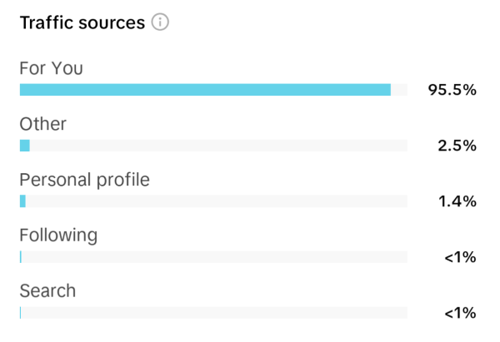
Translating your social media keyword searches into views and traffic means hinges largely on your content. Still, understanding which terms are already performing can guide your content strategy and what phases you can rank for faster.
2. Conduct a Social Media Keyword Audit of Your Industry
The next step in filling up your social media keyword list is to widen your net. That means:
- Auditing the social profiles of your competitors to identify phrases and keyword terms they use in their hashtags, captions and video descriptions. What words and phrases appear in all of the above? What about comments?
- Searching for words and phrases specific to your industry or target audience (think: long-tail terms like “k beauty sunscreen for acne prone skin”). From here, you’ll uncover creators and influencers who promote products similar to your own. Note the language they use (written and spoken!) in their videos and photos.
You’ll likely find an overlap between phrases your competitors use and the terms popping up in creators’ content. Flag these social media keywords and consider how you can target them.
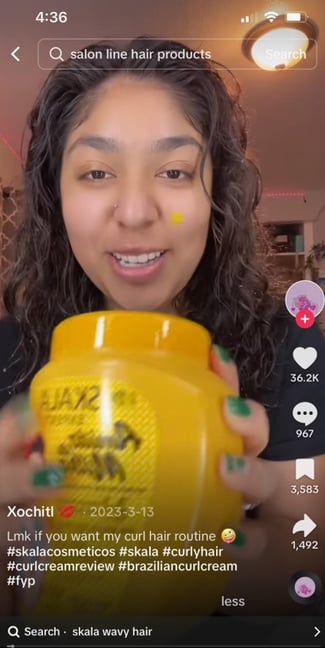
Source
Completing the homework above helps you understand your competitors’ social SEO strategies (if they have one!) plus relevant pain points your audience is facing. These challenges often translate into hidden social SEO gems.
As a bonus, you can also use this social media keyword research for competitive analysis to find hidden opportunities for your brand. For example, if customers are complaining about the flaky texture of a competitor’s cosmetics product, it would make sense for you and your creators to emphasize the non-flaky nature of your own.
See how that works? By mining your competitor’s content plus your creators' content, you’ll get a better understanding of what challenges and specific challenges you can create content around.
3. Use Social Media Keyword Research Tools for Confirmation
By now you’re probably brainstorming content ideas that feature your keywords.
Good! But before getting too ahead of yourself, take a moment to confirm the search volume and landscape for your social SEO competition.
Note that social media keyword data isn’t super public and tools are still evolving. Thankfully, there are a couple of ways to confirm whether a keyword is viable:
- Test a few social media SEO tools to understand the real-time popularity of keyword phrases and what people are actually using.
- Dig into TikTok’s Creative Center. This is a fast way to find common phrases and terms being spoken in ads related to your industry. These same phrases often appear in organic content, too.
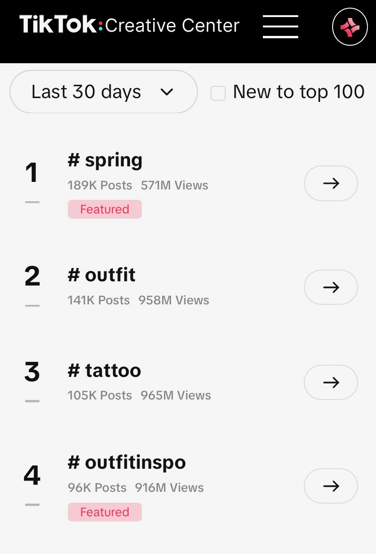
Source
Remember: don’t second-guess what your customers think when the data is out there with a bit of digging. Use these tools to confirm what your audience wants and what they’re searching for based on hard numbers.
4. Narrow Your List to the Right Types of Social Media Keywords
Now you’re ready to rank!
We can use all of the information above to complete our social media keyword list.
Still, not all social media keywords are equal in terms of how easy they are to target or integrate into your social content. The more seamless it is to create content around keywords, the easier it is to scale your content and rank.
Narrowing your list means understanding the different types of keywords and that make sense for your brand. Below is a rundown of the most common types of phrases you see in Google searches that are ideal to target in your social content. Keep in mind that there is some overlap between them.
Pain Point Keywords
These phrases reflect the need for a solution to a specific problem related to your product (ex: “effective acne scarring treatments”). Pain point keywords shed light on searchers' challenges and are among the most valuable types of social media keywords.
Jobs-to-be-Done (JTBD) Keywords
These keywords relate to questions based on something the searcher intends to do (“how to train for a marathon”). JTBD keywords can also be combined with pain point keywords (ex: “safe way to whiten teeth”).
These phrases are sometimes in the form of a question but trimmed down to be more conversational (ex: "what is the fastest way to heal acne scars" versus "fastest way to heal acne scars").
Superlative Keywords
Only the best will do! These types of keywords imply that the searcher is looking for a product based on customer consensus. Superlative keywords imply that searchers want to see reviews and results.
These social media keywords might include “best floating eyeliner,” or “cutest joggers for traveling.” Superlative keywords can often be combined with JTBD keywords.
Branded Keywords
With these terms, the consumer is actively researching products and needs help making a choice. For example, someone might search “Dove body wash” or “Revlon matte red lipstick” to get unfiltered thoughts from fellow creators and influencers. These keywords signal high purchase intent.
If you want to “test” any of these keywords for volume, try searching keyword phrases on Instagram or TikTok and seeing what pops up via autocomplete (ex: the “others searched for” results in TikTok).
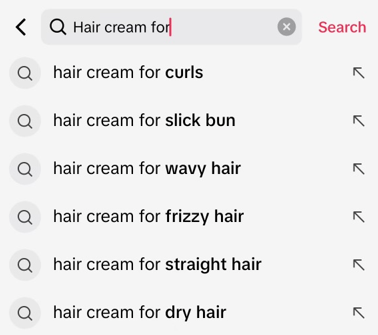
Just remember: social search terms can get super specific! When in doubt, focus on high-intent and long-tail keyword phrases over generic terms. For example, targeting “hair cream for type 4c curls” instead of just “hair products” or even “hair cream.”
What Else Should Brands Know About Ranking for Social Media Keywords?
If you’re ready to rock the rankings, don’t forget these important points:
- There’s no “right” amount of keywords to target. As with traditional SEO, you need data to make information decisions. Opportunities to rank change as your industry and competitors change. Be ready to experiment but start by focusing on a social media keyword list with proven volume that you can seamlessly weave into your content.
- Not all social media keywords necessarily need to be researched. Chances are you already target and incorporate phrases into your content without really knowing the volume. Something like “low-calorie energy drink” or “sugar-free energy drink” are descriptors that make sense and sound natural. Don’t overhaul the language you use based solely on what’s ranking.
- Keywords are everywhere (so use them everywhere). Note that social apps detect keyword phrases via caption text, descriptions, hashtags and even spoken words in videos. Cover your bases.
- Absolutely no keyword stuffing! Ever. End of story. Stuffing keywords into your social posts can result in limited reach or action against your account(s) for spam.
- Be patient. Ranking requires playing a long game. Through consistent content and sourcing UGC, you can understand what’s working and refine your content strategy over time. That includes targeting new keywords and experimenting with different types of content.

How to Rank for Social Media Keywords Faster
With the rise of social SEO, brands are scrambling to cement their rankings sooner rather than later.
More commercial searches happening across TikTok and Instagram isn’t a trend that’s going to slow down any time soon. In fact, trends and what we've seen firsthand imply the opposite.
That’s why anything you can do to make your brand appear in social search is a plus.
Our recommendation? Start by using your social media keyword research for content creation to build a foundation to rank.
The challenge for brands is related to volume, though. Ranking for keywords and getting picked up by the algorithm is next to impossible if you’re doing it alone. With consistent influencer posts and UGC, brands can feed the algorithms fresh content to increase social search rankings and stay top-of-mind among shoppers.
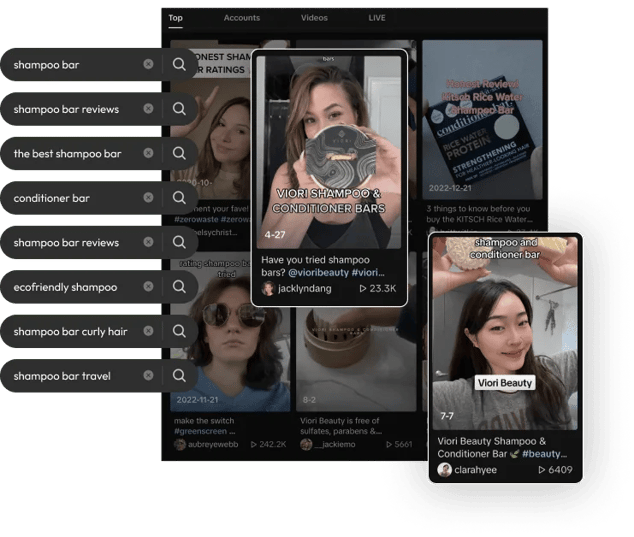 That’s exactly where Statusphere’s micro-influencer marketing platform can help.
That’s exactly where Statusphere’s micro-influencer marketing platform can help.
Our software matches brands with creators from our vetted network for collaborations at scale. With automated matchmaking, streamlined fulfillment and in-depth reporting, brands can generate more UGC and build their social SEO presence without waiting.
We’ve already powered 75,000 influencer posts on behalf of 400+ CPG brands.
Want to learn more about how our platform works? Get in touch with one of our experts to see how we can help you get more influencer content in a fraction of the time.



 That’s exactly where Statusphere’s micro-influencer marketing platform can help.
That’s exactly where Statusphere’s micro-influencer marketing platform can help.